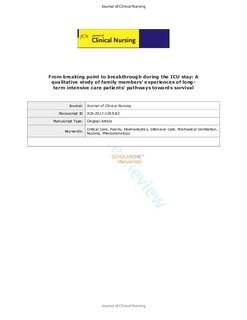| dc.contributor.author | Haugdahl, Hege Selnes | |
| dc.contributor.author | Eide, Regina | |
| dc.contributor.author | Alexandersen, Ingeborg | |
| dc.contributor.author | Paulsby, Tove Engan | |
| dc.contributor.author | Stjern, Berit | |
| dc.contributor.author | Lund, Stine Borgen | |
| dc.contributor.author | Haugan, Gørill | |
| dc.date.accessioned | 2019-03-05T12:12:21Z | |
| dc.date.available | 2019-03-05T12:12:21Z | |
| dc.date.created | 2018-05-07T23:42:08Z | |
| dc.date.issued | 2018 | |
| dc.identifier.citation | Journal of Clinical Nursing. 2018, 27 (19-20), 3630-3640. | nb_NO |
| dc.identifier.issn | 0962-1067 | |
| dc.identifier.uri | http://hdl.handle.net/11250/2588748 | |
| dc.description.abstract | Aims and objectives
To explore family members’ experiences of long‐term intensive care unit (ICU) patients’ pathways towards survival and to highlight family members’ efforts to promote the patient's health during the ICU stay.
Background
Although considerable research has been devoted to the substantial burden of long‐term ICU patients, less attention has been paid to health‐promoting factors that facilitate patients’ health and survival during ICU stays. Support from family members can improve patient outcome. However, there is little knowledge of the specific contributions provided by family members.
Design
A hermeneutic phenomenological approach, within the context of Antonovsky's salutogenic theory and Merleau‐Ponty's phenomenology of the body, involving the body as the fundament of experience and understanding.
Methods
In‐depth qualitative interviews. Thirteen family members of long‐term ICU patients were interviewed once, at six to 18 months after ICU discharge. The consolidated criteria for reporting qualitative research were used.
Results
Three themes were identified: (i) A body at a breaking point; (ii) family members’ presence; and (iii) breaking through. In the perspective of the family members, their beloved ones were at a breaking point between life and death. The family's presence was significantly health promoting, demonstrating and communicating love and sensitivity. Moreover, family members’ understanding of the patient's unique characteristics and personality was crucial to the patient's experience of being understood, recognised and acknowledged. Inner strength represented a life force capable of moving the patient from the breaking point towards a breakthrough towards life. Family members purposely used their knowledge about the patient to trigger, nurture and release the patient's inner strength.
Conclusions
Family presence helps to trigger, arouse and release a patient's inner strength, representing important health‐promoting factors facilitating patients’ health and survival during an ICU stay. | nb_NO |
| dc.language.iso | eng | nb_NO |
| dc.publisher | Wiley | nb_NO |
| dc.title | From breaking point to breakthrough during the ICU stay: A qualitative study of family members’ experiences of long-term intensive care patients’ pathways towards survival | nb_NO |
| dc.type | Journal article | nb_NO |
| dc.type | Peer reviewed | nb_NO |
| dc.description.version | acceptedVersion | nb_NO |
| dc.source.pagenumber | 3630-3640 | nb_NO |
| dc.source.volume | 27 | nb_NO |
| dc.source.journal | Journal of Clinical Nursing | nb_NO |
| dc.source.issue | 19-20 | nb_NO |
| dc.identifier.doi | 10.1111/jocn.14523 | |
| dc.identifier.cristin | 1583994 | |
| dc.description.localcode | Locked until 18.05.2019 due to copyright restrictions. This is the peer reviewed version of an article, which has been published in final form at https://doi.org/10.1111/jocn.14523. This article may be used for non-commercial purposes in accordance with Wiley Terms and Conditions for Self-Archiving. | nb_NO |
| cristin.unitcode | 194,65,20,0 | |
| cristin.unitname | Institutt for samfunnsmedisin og sykepleie | |
| cristin.ispublished | true | |
| cristin.fulltext | postprint | |
| cristin.qualitycode | 2 | |
